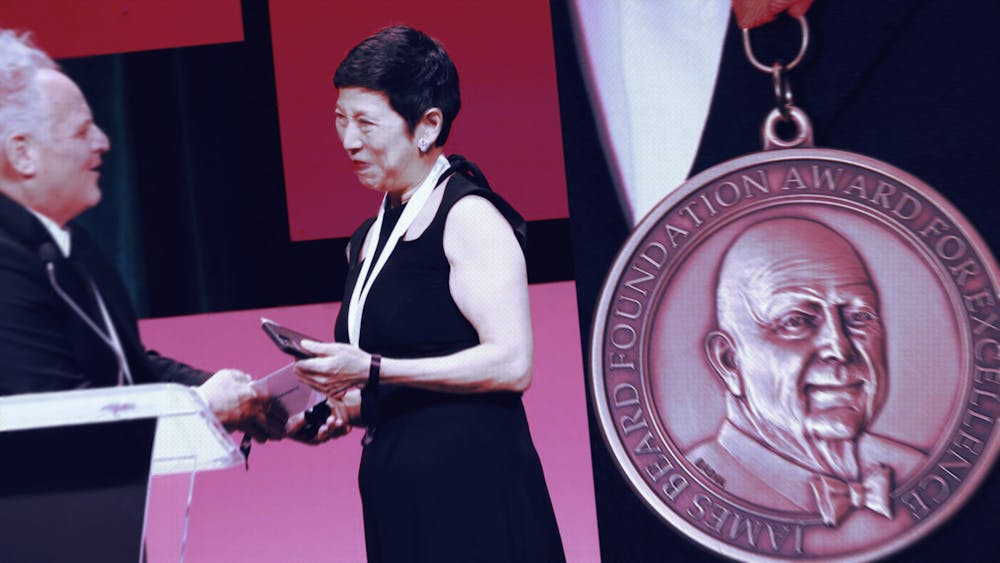“I started as a bus girl and, you know, I just fell in love with it,” Ellen Yin (W ‘87, WG ‘93) says when I ask her what inspired her career in the restaurant industry. “People always say ‘Oh, I’ve got the bug, the restaurant bug.’ It’s one of those things that’s very satisfying, because you’re taking care of customers; you see people celebrating important occasions whether it be birthdays or anniversaries. It’s very satisfying to be a part of those celebrations,” she concludes.
Yin was named the James Beard “Outstanding Restaurateur” earlier this June. The criteria for this prestigious title fits her to a tee: building community, creativity, integrity, and creating a sustainable work culture and positive environment.
Yin first opened the restaurant Fork in 1997, which just celebrated its twenty–fifth anniversary and has remained a staple of the city. Since then, she’s formed High Street Hospitality Group with chef Eli Kulp—the two also own and operate High Street Philly, A.Kitchen + Bar, and High Street Hoagies, which has a stall in Franklin's Table Food Hall. Yin has become an established name in the Philadelphia restaurant scene and is an activist within the industry—her latest title as “Outstanding Restaurateur” is a neat addition to her previously–won accolades. However, her path has not been a straightforward one.
Yin always had a love for the restaurant industry. She grew up in a big family where meals were the center point of gatherings. “Much of my childhood was spent on the weekends, helping my mother get ready to entertain, helping to set the table, clean up, all of that kind of thing; but I loved it,” she tells me. Her first job was at a restaurant, and it quickly became a place of belonging compared to how isolated she felt as a member of one of the only Asian American families in her community. She found that the diverse backgrounds of her co–workers made her feel less like an outsider.
At Penn, Yin struggled with that same sense of isolation, and found herself conflicted and unsure if she belonged at the University. She knew that she wanted to pursue a restaurant–oriented career above all else, and missed the sense of connection she once had at her old job. After taking a semester off during her sophomore year, Yin came back and began working at a restaurant, and found it to be a comforting escape. She graduated as an entrepreneurial management major and had even planned out a restaurant with a classmate. But her parents were adamant that she needed a backup and the plans fell through.
“I came to the realization that I would have to actually get a non–restaurant job, and that’s how my non–restaurant career started,” Yin says.
Yin had a brief but impactful stint outside of the industry where she worked as a candy striper, complete with the pin–stripe uniform; at a small advertising agency; and with a large consulting firm. During this period, she also began working with the American Heart Association and found a real love for nonprofit work, but felt that she needed something more fast–paced. However, that passion for helping others would become the through–line of her future career.
“I wouldn’t call myself an activist, but I do like doing work in unity and helping people and trying to take care of people,” she tells me candidly, when I ask about her work uplifting marginalized voices. Yin co–founded the Sisterly Love Collective in 2020, a group dedicated to creating connections and promoting success between women working in hospitality.
More recently, in 2021, Yin created the Wonton Project in support of the Asian Americans after violence towards the minority increased due to the pandemic. Originally, the Project was only a delivery pop–up with proceeds going to Asian Americans United and Advancing Justice, but she found that it took on a deeper meaning to her and her identity. “I know that I’m Asian American, but I had never really embraced what that meant,” she says. “It wasn’t until the Atlanta Asian violence in March of 2021 that I really was like, ‘Wow, I could be that person too.’”
The recipes in the Wonton Project were inspired by Yin’s mother. She likened the wonton to spaghetti and meatballs—something easy to make and always eaten, whether as a big family meal or alone in an apartment. The pop–up found great success and has become a more permanent fixture, with 5% of proceeds continuing to be donated to efforts against Asian discrimination.
The pandemic as a whole took a noticeable hit on the restaurant industry due to its reliance on social connection. But Yin is confident about the future, and hopes to see a resurgence in the business. She’s found her work to be rewarding, and feels it provides a great sense of community not only for herself, but the many people she’s been able to work with and serve.
“I feel extremely fortunate that I’m able to pursue a career that I love," Yin says. "People always ask me about work–life balance, but for me, work–life balance is that I love what I do.”

